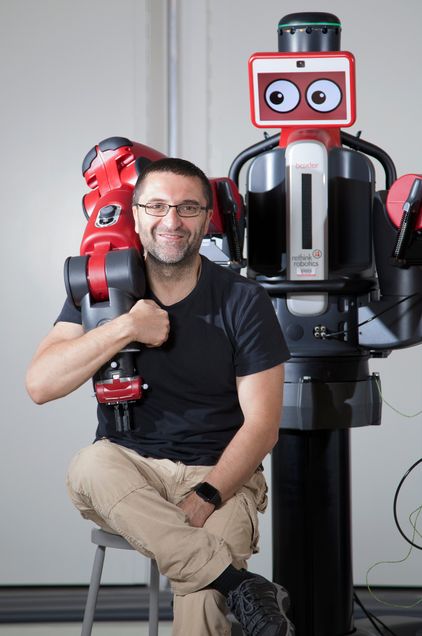College Establishes New Center for Autonomous and Robotics Systems
Professor Calin Belta will serve as the inaugural director
By Liz Sheeley
The College of Engineering has established a new, interdisciplinary Center for Autonomous and Robotics Systems (CARS) that will build upon the expertise and experience of the current faculty and advanced facilities.
Professor Calin Belta (ME, SE, ECE), who heads up the Boston University (BU) Robotics Laboratory, has been appointed the inaugural director of the Center. Belta says that CARS is a natural expansion of the Robotics Lab; the Center will allow the scope of research to broaden with increased funding, the addition of outside collaborators, and increased internal collaboration. The Robotics Lab will transform from a facility for experimental research to a multi-functional center with space to design robots that can perform complex physical tasks like moving objects around and also open up more room for students.

The Center will focus on three main research application areas: the science of autonomy; robotic vehicles and manipulators; and microbiological robotics. “As one part of CARS, we want to create a center of excellence for autonomy, by involving industry and academic partners locally, nationally, and internationally,” says Belta.
All of these applications focus on the growing ambition to bring artificial intelligence (AI) into the physical world. Although machine learning has allowed for the creation of some great innovations, Belta believes that neural networks are still not well understood. To bring AI into the physical world means building autonomous machines like self-driving cars, but there is still uncertainty in how that car would behave in a safety-critical environment. That is one of the large issues Belta hopes to tackle with the establishment of CARS.
“One focus of ours will be on all the connections between robotics and biology,” says Belta. He hopes to collaborate with the Biological Design Center (BDC), an internal interdisciplinary center working in synthetic biology and cellular engineering. Belta and his team already have external grants related to those fields through their interests in microbiological robotics. One project Belta is involved in is developing micron-scale robots that can organize living cells that contain synthetic genetic circuits using magnetic fields. The cells can then be triggered to perform their synthetic functions chemically or using light. The hope is that the entire process could be automated in the future to build engineered tissues or organs from stem cells.
Belta stresses that the Center will not just be an expansion of the current projects in the Robotics Lab. In addition to research, the Center will hold workshops and invited talks and function to unify and gather together scientists from academia and industry. “With the Center we want to formulate some challenges which function like open questions,” he says. “We want to trigger collaborations and hopefully go out and bring back funding to keep the Center running once the five-year funding from the College is over.”